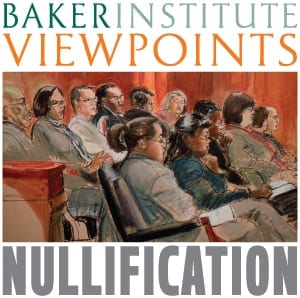Jury nullification — when a jury disagrees with the law and acquits a defendant they believe to be guilty — has a long history in the United States of serving as a bellwether for social change on unpopular laws. There are numerous historical examples of juries nullifying laws that would later change due to vast public opposition. More recently, legal professionals have identified jury nullification verdicts in marijuana cases. This should not be surprising given society’s rapidly changing view of marijuana — support for legalization now polls at 58 percent nationally, and in Texas it polls equally well. In this installment of Baker Institute Viewpoints, experts discuss the question, “What does jury nullification of marijuana cases in Texas indicate about the possibility of marijuana legalization?”
Read other posts in this series:
- Jury nullification: Local option by William Martin, Ph.D., the Harry and Hazel Chavanne Senior Fellow in Religion and Public Policy at the Baker Institute, the Chavanne Emeritus Professor of Sociology at Rice University and the director of the institute’s Drug Policy Program
- Ceasefire in the war on marijuana in Texas? Trial by jury and jury nullification by Gilbert G. Garcia, a board certified criminal lawyer and a member of The National Organization for the Reform of Marijuana Laws
- Prioritizing public safety over applying outdated drug policy by Rehman Bhalesha, research assistant at South Texas College of Law
Public opinion on marijuana isn’t changing — it has already changed. In 1969, 84 percent of Americans thought marijuana should be illegal. By 2001, that number was down to 64 percent. By 2013, only 39 percent of Americans thought the recreational use of marijuana should be a crime — in spite of the fact that marijuana usage rates have not changed. An even greater majority of Americans believe marijuana should be legally available as medicine.
The 19th-century abolitionist Wendell Phillips once stated, “Law is nothing unless close behind it stands a warm, living public opinion.” Evidence that the war on marijuana lacks public support can be found in the widespread violations of marijuana law, in the general acceptance of marijuana use and in the frequent portrayals of marijuana use in popular culture. As two states have now legalized recreational marijuana and several others appear poised to do so, the only question is how many more lives and dollars will be spent in the attempt to prohibit something most Americans do not think should be prohibited.
Legal change is slow, and it should be. No sensible person wants the law to change with every passing fad and fancy; too often, laws passed quickly in response to public outcry turn out to be public policy nightmares. However, when legislative bodies stonewall a much-needed change, our system of justice falls into disgrace.
According to former Supreme Court Justice Louis D. Brandeis, “If we desire respect for the law, we must first make the law respectable.” A law that more than one-third of American adults have violated, that is the cause of about three-quarters of a million arrests annually, and that is widely seen as fostering untenable violence both here in the United States and abroad, is not respected and is not respectable. Fortunately, we, the people, have a tool at our disposal to speed up the process of legal change: jury service.
Nobody in the United States can be convicted of a serious crime without the acquiescence of a jury. When juries refuse to convict in spite of proof of guilt because they believe the law is unjust or unjustly applied, we call it “jury nullification.” According to John Whitehead of the Rutherford Institute, while jury nullification is not a power to be taken lightly, it is a prerogative the founders of this country valued and intended to safeguard for future generations. A juror cannot be punished for his or her vote, and jury acquittals are final under the double jeopardy clause of the Fifth Amendment. No matter what the evidence, a jury is empowered to acquit, and no judge can take that authority from them. At some point, should they believe a conviction would be unjust, American jurors are empowered to exercise their prerogative to “just say no” — and occasionally, they do just that.
Under alcohol prohibition, such acquittals made Prohibition unsustainable; the law that could never be repealed was repealed, because public opinion made it unenforceable. The ban on marijuana — another law that it sometimes seems can never be repealed — is just as vulnerable to the judgment of American jurors.
Historically, heroic juries have guaranteed freedom of the press and freedom of religion, helped bring about the end of slavery, voiced opposition to the Vietnam War, and recognized the battered spouse syndrome long before our legal system did. We, the people, get the last word — if we have the independence to speak. But, sadly, too often we don’t. You would not think Americans had become so timid.
In the 1960s, professor Stanley Milgram conducted a series of experiments on obedience to authority and discovered that a huge majority of Americans were willing to act in ways that violated their own moral judgment when an authority figure — a college professor in a white lab coat — told them those actions were required. Jurors face a much more intimidating authority figure — a judge in a somber courtroom, backed by bailiffs, jails and the power of the law. Standing up to that authority figure takes the sort of independence and integrity that is not easily mustered.
It wasn’t always this way. Americans in the 19th century understood the importance of the jury in monitoring and regulating our justice system — and understood that jury nullification was part of that role. Today, too many of us take the jury for granted and dismiss jurors as “twelve people too dumb to get out of jury duty.” We are a nation of specialists who do not want to take time out of our lives to work on issues of public concern. We don’t want to get involved; we can barely be bothered to get out to vote. If we do show up for jury duty, it is our responsibility to see through the abstractions to the fact that we are judging real people in real cases that will have real consequences for the rest of their very real lives.
Jurors have the prerogative to take a broader view of their jobs, one more in line with the history and purpose of the institution of trial by jury. Jurors can take an active role in the administration of justice and apply that “warm, living public opinion” to determine whether to label one of their neighbors a criminal. In doing so, they just might save a morally innocent (albeit technically guilty) individual from an unjust conviction and save our prisons, probation officers and social workers the expense of dealing with one more unnecessarily shattered life.
 Clay S. Conrad is an attorney in private practice in Houston with the firm of Looney & Conrad, P.C. He is the author of “Jury Nullification: The Evolution of a Doctrine,” recently re-released by the Cato Institute.
Clay S. Conrad is an attorney in private practice in Houston with the firm of Looney & Conrad, P.C. He is the author of “Jury Nullification: The Evolution of a Doctrine,” recently re-released by the Cato Institute.
